 klaus-michael schneider
klaus-michael schneider
Keywords: colombia |
Links: FOTW homepage | search | disclaimer and copyright | write us | mirrors

FOTW beschäftigt sich mit der Wissenschaft der Vexillologie (Flaggenkunde).
Alle auf dieser Website dargebotenen Abbildungen dienen ausschließlich der Informationsvermittlung im Sinne der Flaggenkunde.
Wir distanziert uns ausdrücklich von allen hierauf dargestellten Symbolen verfassungsfeindlicher Organisationen.
Last modified: 2021-08-26 by  klaus-michael schneider
klaus-michael schneider
Keywords: colombia |
Links: FOTW homepage |
search |
disclaimer and copyright |
write us |
mirrors
Editorial Remark: It must be noted that all the opinions are of the authors and not of FOTW. Our site is non-political and concentrates only on vexillological issues.
See also:
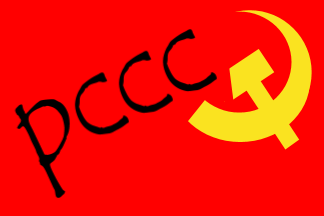 image by Eugene Ipavec, 27 May 2006
image by Eugene Ipavec, 27 May 2006
There is a flag on plain red background, resembling the same
colors as the Partido Comunista Colombiano (Colombian Communist Party). This flag is the flag of the PCCC, which
stands for Partido Comunista Colombiano Clandestino (Colombian
Clandestine Communist Party), an organization that runs parallel
to Movimiento Bolivariano para la Nueva Colombia (Bolivarian Movement for the New Colombia). This PCCC organization is an
organization created by the
FARC in
order to replace the original PCC (Colombian Communist Party)
because the Farc believes that the PCC is not radical enough and
does not consider armed struggle to reach power. The flag is, as
I mentioned before, a plain rectangular red flag, with the letters
PCCC in black on the flag in diagonal form starting from the
bottom left and ending on the top right, on the top right having
a yellow hammer and sickle.
Sources: Resistencia - Farc online magazine at redresistencia.org.
ANNCOL - Farc news website at
www.anncol.org.
Semana magazine edition
October 1, 2001, page 52.
E.R., 27 May 2006
Unusual in a communist flag for the emblem to be in the fly.
Eugene Ipavec, 27 May 2006
Variant
 image by Eugene Ipavec, 30 May 2006
image by Eugene Ipavec, 30 May 2006
I found a variant of the flag of the PCCC. This time the
letters appear in white, plus the hammer and sickle (also in
white). Background is plain red and the design resembles pretty
much the flag of the PCC.
Source:
www.anncol.org.
E.R., 30 May 2006
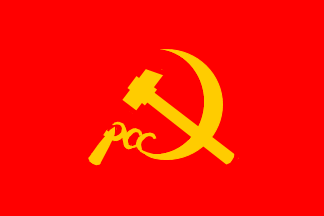 image by Eugene Ipavec, 29 July 2007
image by Eugene Ipavec, 29 July 2007
PCC stands for Partido Comunista Colombiano (Colombian
Communist Party). This organization was established in 1930. Its
official website is www.pacocol.org.
E.R., 23 March 2005 and 25 December 2006
 image by Eugene Ipavec, 23 December 2005
image by Eugene Ipavec, 23 December 2005
The Partido Comunista de Colombia - Maoísta (Colombian
Communist Party - Maoist) is a split group from the PCC
(Colombian Communist Party). The PCC-M was established in 2001.
It has an official website: pccm0.tripod.com. the
PCC-M's flag is the same as the PCC's flag regarding ratio of the
hammer and sickle.
E.R., 23 March and 23 December 2005
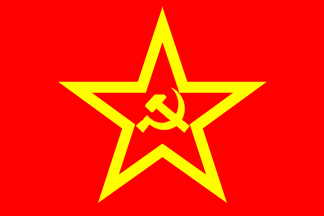 image by Eugene Ipavec, 29 July 2007
image by Eugene Ipavec, 29 July 2007
The Partido Comunista de Colombia - Marxista Leninista
(Colombian Communist Party - Marxist Leninist) was a split group
of the Colombian Communist Party, established in 1967. The armed
wing of the PCC-ML was the
EPL
(Ejército Popular de Liberación).
E.R., 23 March 2005
.gif) image from
wikipedia
image from
wikipedia
logo
There
was a Colombian armed guerrilla group: Partido Revolucionario de
los Trabajdores de Colombia (PRT), or Colombian Revolutionary
Workers Party. The party was founded in 1982, but started its
armed struggle in 1984. It emerged out of the 'Majority' faction
of the Marxist-Leninist-Maoist Tendency, abbreviated as Tendencia
ML (ML Tendency). The ML Tendency emerged in late 1974/early
1975, after the 4th plenary session of the Central Committee of
the ML). The founders of Tendencia ML,
had been based in the Pedro Vásquez Rendón regional committee
of PCC(ML) in the Department of Antioquia.
They opposed the directive of the PCC(ML) party leadership that
cadres in the urban labour, student and teachers movements had to
shift to the countryside to join the
Popular Liberation Army. The Tendencia ML criticized PCC(ML) for
giving insufficient importance to trade unionism, electoral work
and other mass struggles.
Regional committees of Tendencia included: Antioquia: Pedro
Vásquez Rendón Western Colombia: Ricardo Torres
Bogotá/Cundinamarca: Enver Hoxha Atlantic Coast: Bernardo
Ferreira Grandet
Tendencia ML was given by internal divisions. By the late 1970s,
two separate groups had emerged, the 'Majority' and the
'Minority'. The 'Majority' would later form the Workers
Revolutionary Party (PRT) whereas the 'Minority' joined forces
with the Revolutionary Unification Movement - Marxist-Leninist,
merging into it by 1982.
The PRT was a group that had broken away from the Communist Party
of Colombia (Marxist-Leninist) in the mid-1970s. It was mainly
active in the Departments of Sucre and Bolívar.
When the PRT militias were demobilized in January 25, 1991 it had
around 200 fighters. Apart from its armed struggle PRT maintained
an open mass front, the trade union organization called Corriente
de Integración Sindical.
Sources:
wikipedia,
www.mediosparalapaz.org>.
E.R., 3 September 2007
PTC (Moirista) - Partido del Trabajo de Colombia (Moirista)
(Colombian Workers Party (Moirist)) was established in 2001, based on the Organización Comunista de Colombia - Marxista
Leninista Maoísta (Colombian Communist Organization - Marxist
Leninist Maoist) which in turn was established back in 1990. The
establishment of the PTC (Moirista) was due to the abandoning of
the Marxism-Leninism doctrine by the
EPL.
E.R., 3 September 2007
.gif)
logo
image by Eugene Ipavec, 3 November 2007
It is the logo of the Corporación Democracia (Democracy
Corporation), an organization that comprises demobilized
combatants from the following
AUC
structures:
-
Héroes of Granada Bloc (Bloque
Héroes de Granada)
- Bloque Cacique Nutibara (logo)
- Bloque Héroes de Tolová
I have not seen a flag yet, but I do think they have one.
Source: Screenshot from
official website.
E.R., 3 November 2007
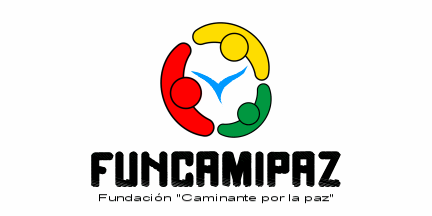 image by Eugene Ipavec, 3 November 2007
image by Eugene Ipavec, 3 November 2007
I found recently on the web the flag of a Colombian
organization at a rally. This organization is called FUNCAMIPAZ
(Fundación 'Caminate por la Paz', or Walker for Peace
Foundation). It is made up of former Auc combatants, and it is
established in Medellin. It supports sports activities and also
farming projects.
Source: Corporación
Democracia website.
E.R., 3 November 2007
There's a group called Erg (Ejercito Revolucionario
Guevarista, or Guevarist Revolutionary Army), named after Ernesto
Guevara de la Serna, alias "El Che". This is a
breakaway faction of the
ELN.
The remnantas of the group, 45 members total, demobilized on
August 14, 2008, on the Municipality of Carmen de Atrato in the
Department of Choco. Its area of influence was the Department of Choco, the Southwesternt part of the
Department of Antioquia and the
Department of Risaralda.
For more info please see: High
Commissioner for Peace, official website, Ministery
of Defense web site, General
Command of Military Forces web site, El
Tiempo and El
Mundo.
The flag for this group is supposed to be the same color scheme
as the Eln flag with the same
proportion as well, only that in the middle it features Erg logo.
E.R., 16 August 2008
 image by Eugene Ipavec, 14 October 2007
image by Eugene Ipavec, 14 October 2007
party flag
 image by Eugene Ipavec, 14 October 2007
image by Eugene Ipavec, 14 October 2007
plain flag
1.gif) image by Eugene Ipavec, 14 October 2007
image by Eugene Ipavec, 14 October 2007
current logo
.gif) image by Eugene Ipavec, 14 October 2007
image by Eugene Ipavec, 14 October 2007
previous logo
PDI (Polo Democrático Independiente, or Independent
Democratic Pole): A broad coalition of leftist movements, it is a
legal democratic party in Colombia. Its official website is www.polodemocratico.net.
E.R., 23 March 2005
At El Tiempo newspaper,
a photo appeared on September 11, 2007. It features a PDI
sympathizer waiving a PDI flag outside an election post back in
2003.
The Party's current is shown at Vivir
En El Poblado (Living at El Poblado, a local newspaper of the
Neighborhood El Poblado, in the city of Medellin, showing the
CV's of political candidates aspiring to the 2007 elections.
E.R., 14 and 23 October 2007
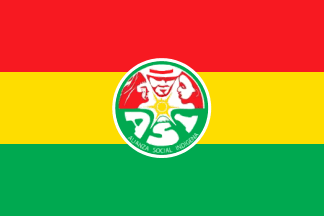 image by Eugene Ipavec, 4 November 2007
image by Eugene Ipavec, 4 November 2007
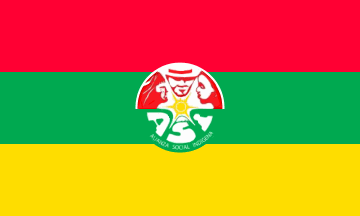 image by Eugene Ipavec, 4 November 2007
image by Eugene Ipavec, 4 November 2007
.gif) image by Eugene Ipavec, 4 November 2007
image by Eugene Ipavec, 4 November 2007
The ASI was established in June 1991 during an Assembly held
by the Yaguará natives in the Municipality of Chaparral. There are several leaders
from Cauca, Tólima
and Antioquia. They currently have
political representation at different levels in different
Municipalities and Departments.
Source:
vivirenelpoblado.com>
E.R., 4 November 2007
The ASI has changed its name to Alianza Social Independiente during an
Extraordinary Convention held between January 28 and 29 of 2011, through voting.
Sources:
http://www.asicolombia.com/index.php/nuestro-partido/historia
http://es.wikipedia.org/wiki/Alianza_Social_Independiente
The new flag is the
logo
in a white circle, in the middle of the flag, which is a rectangular flag
divided into three equally sized stripes (yellow on top, green on the middle and
red on the bottom) as seen
here (flag
on the left).
Source:
http://www.asicolombia.com/index.php/20-asi/comunicados/225-el-partido-alianza-social-independiente-asi-rechaza-el-asesinato-del-presidente-del-concejo-municipl-de-puerto-asis
There is a variant, which is the same logo on a white horizontal flag, as seen
here.
Source:
http://www.unidadnacional.com.co/noticias/alianza-social-independiente--asi--adhirio-a--juan-manuel-santos-presidente-
For additional information please refer to
ASI (official website)
Esteban Rivera, 07 January 2014
.jpg)
logo
image from
www.aperturaliberal.com
The Movimiento Apertura Liberal was established in January
1993, by the congregation of four councilmen from the city of Cúcuta and was recognized officially by
the C.N.E. on July 24, 1997. It
currently has representation in different Departments and cities
at different levels.
Source: www.aperturaliberal.com>
E.R., 12 November 2007
 image by Eugene Ipavec, 17 July 2007
image by Eugene Ipavec, 17 July 2007
MRL (Movimiento Revolucionario Liberal), was founded by
Alfonso López Michelsen in 1959. The MRL lasted from 1959 until
1966, achieving several seats in Congress and also some victories
on the Sate and Local level, when it returned to the
Liberal Party of Colombia mainstream
in an agreement to accept several changes proposed by the MRL
dissident leader.
The MRL flag is the plain Colombian Liberal Party flag plus the
capital white initials MRL and can be seen at b/w picture that
appeared on El
Tiempo newspaper as a slideshow depicting the life and
achievements of Alfonso López Michelsen
E.R., 17 July 2007
![[M19 Guerilla Movement (Colombia)]](../images/c/co}pepes.gif) image by Jaume Ollé and Eugene Ipavec, 29 July
2007
image by Jaume Ollé and Eugene Ipavec, 29 July
2007
An armed illegal group created in 1992 was called "Los
Pepes" (Pepes stands for Perseguidos por Pablo Escobar, or
Persecuted by Pablo Escobar). This was a mixture between
Escobar's former Medellin Cartel associates and Cali Cartel
rivals, who, after Pablo Escobar was interned in La Catedral
prison in 1992, he (Escobar) started to murder his closest
Medellin Cartel associates. Thus, this anti-Escobar alliance
proved helpful for Colombian authorities when this organization
started to hunt his lawyers, Escobar's relatives, associates,
hideouts, properties, bodyguards, and tip the Colombian legal
authorities with valuable information. Los Pepes disbanded later
in 1993, but this was somehow the main core out of which the
current AUC (right wing armed illegal organization) emerged.
Source: photo at SEMANA
magazine - November 30th, 1998 (caption of the photo
(translation): When Los Pepes came out in the open we applauded
them. We almost issued t-shirts saying 'we support Los Pepes' -
Words by Mr. Joe Toft (Director DEA Colombia back then).
E.R., 16 June 2005
Hosted by: Fanshop-Online.de und Handy-Shop.de
Tipp: Apple iPhone 12 im Shop